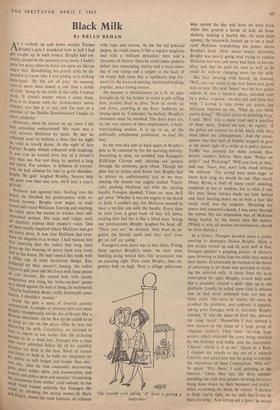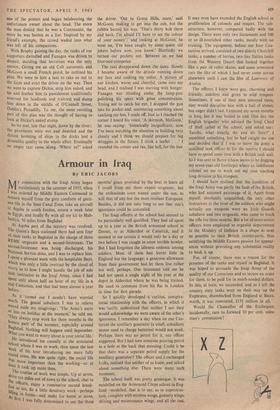Black Milk
By BRIAN BEHAN
As I walked up and down outside Farmer Brophy's gate I wondered how in hell 1 had got caught up in such lunacy. Brophy had evi- dently pondered the question even more. I hadn't gone ten paces when he burst out upon me like an angry bull. Brandishing his crutch aloft he de- manded to know why I was posing as a striking farm-hand. 'By the cut of you,' he sneered, `you've never been nearer a cow than a bottle of milk.' Stung by the truth of this sally, I roared back, 'It doesn't matter where I come from. You're in dispute with the farmworkers' union whether you like it or not, and I'm here as a member of the Dublin Revolutionary League to Show solidarity.'
However, when he turned on my mate I did feel somewhat embarrassed. My mate was a civil servant, McGoon by name. By day he collected taxes to buttress a State that by night he tried to knock down. At the sight of him Farmer Brophy almost collapsed with laughing. It was true he looked even less of a farmer's boy than me. For one thing he sported a long red beard. For another, in defiance of conven- tion, he had allowed his hair to grow shoulder- length. `By god,' laughed Brophy, 'heaven help the Poor cow that sees you, she'll lose a year's growth.'
McGoon just ignored him. Smiling into his beard, he clutched his picket-poster with re- newed fervour. Brophy now began to walk round and round McGoon. Leering and sneering, be called upon the masses to witness their self- appointed saviour. His rude and vulgar serfs all dutifully echoed their master's voice. One of them loudly inquired where McGoon had got his fancy dress. It was true McGoon had over- done his disguise as a worker. I had warned him that morning that the toilers had long since given up the wearing of navvy hard core trews tied at the knees. He had topped this outfit with a filthy cap of truly barbarous design. Em- boldened by their master's teasing, the toilers began to pelt poor old McGoon with large pieces °[ Cow manure. He turned and, with saintly resignation and using his 'strike-on-here' poster as a shield against the hail of dung, he murmured, 7heY're backward, Brian; really backward; semi- fascist, I shouldn't wonder.' Inside the gate a spate of feverish activity c_ommenced. A couple of minutes later out came rg,r.r°PhY triumphantly astride his milk-cart like a to charioteer. As he flew by he called to us .° keel) an eye on the place while he was out aelivering the milk. Crestfallen, we returned to base to report to our leader that the picketing Iseemed to be a dead loss. Fanagen was a man wilo never admitted defeat till all his youthful isciPles lay dead in the dust. Small of stature 4.1.1d funny to look at, he held our allegiance by his ability to talk longer and louder than any-
10. ,
,u,"tS else. Also he was constantly discovering plots within plots, and counterplots, and traitors and police spies and enemies 'threatening small movement from within' until nobody in our m al band trusted anybody but Fanagen. He coull d, by invoking the sacred names of Marx and Engels, invest the most fantastic of schemes
with logic and reason. As for the old political jargon, he could weave it like a regular magician and with a 'militant defeatism' here and a 'dynamic of history' there he could make pathetic defeat into resounding victory and a mass meet- ing of one tramp and a copper at the back of an empty hall seem like a significant step for- ward for the forward-moving, backward-looking, popular, peace-loving masses.
He became a revolutionary in a fit of spite brought on by his failure to make a pile selling holy pictures door to door. Now he strode up and down, scowling at the floor. Suddenly he swung upon us. 'Comrades,' he barked, 'Brophy's resistance must be smashed, The dairy boys are, by the very nature of their employment, a back- ward-looking section. It is up to us, of the politically enlightened proletariat, to lead the way.'
So the next day saw us back again at Brophy's gate as he cantered by for the morning delivery. According to plan, we tumbled into Fanagen's Rififi-type Citroen and, shoving our posters through the windows, gave chase. Though the plan was to picket each house that Brophy had to deliver to, unfortunately just as we were nearing the houses our engine stalled. Franti- cally pushing McGoon out with the starting handle, Fanagen shouted, 'Come on, man, he'll get away.' Whether it was the engine or his beard or both, I couldn't say, but McGoon seemed to have a terrible job with the handle. Every time he bent over, a great hank of hair fell down, making him feel for it like a blind man, Seeing our predicament, Brophy laughed his head off. 'There you are,' he shouted, 'they want to or- ganise the bloody earth and they can't even get an oul' car going.'
Fanagen's next move was to hire bikes. Pitting them against Brophy's mare, we were soon bowling along behind him. Our procession was an amazing sight. First came Brophy, then us; posters held on high. Next a village policeman '7'he trouble with .taking "A" baby-sitter.' level is getting a who cursed the day and hour we were born. After that poured a horde of kids on bone- shakers, making a fearful din. As each door opened, the housewife looked up to see a mad- eyed McGoon brandishing his poster above Brophy's head. After about twenty deliveries, Brophy was nearly going mad trying to explain McGoon was not, and never had been, in his em- ploy, and that he paid his men as well as he could do without charging more for the milk.
His face twisting with hatred, he foamed, 'Well, you can come to my next house and good luck to you.' His next 'house' was the new police station. It was a massive place, watched over by a police sergeant : six feet tall and three feet wide. I started to take down my poster, but McGoon wheeled on me, 'What do you think you're doing?' We can't carry on picketing here,' I said. 'Here' was a main road and a junction of three more. 'Indeed we can,' he replied, `if the police are content to drink black milk they must taken the consequences.' And the conse- quence was that half of Dublin stopped to gaze at the novel sight of a strike at a police station. Traffic was jammed for miles around. Bus- drivers couldn't believe their eyes. 'Police on strike?' and 'Picketing?' Will you look at that,' said one. 'fast's, they don't look much without the uniform.' The crowd were most eager to know how long we would be out. One rascal, Dinny Byrne, a thief of many years' standing, implored us not to weaken, but to stick it out, like men. Some instinct made me look behind and there bearing down on us with a face like wrath itself was the sergeant. Thrusting my poster into someone's hands, I was away through the crowd. My last impression was of McGoon being hauled, by his beard, into the station. (Which is why all serious revolutionaries should be clean-shaven.)
In a frenzy, Fanagen decided upon a public meeting to denounce Dickie Brophy. Quite a few people turned up and all went well at first. Fanagen painted a gripping picture of Dickie's men shivering in filthy lean-tos while they milked their beasts. Dramatically he warned of the threat of poisoning to all those who persisted in drink- ing the infected milk. A shout from the back interrupted his spiel. Brophy, crutch held aloft like a crusader, cleared a path right up to the platform. Loudly he called upon God to witness that he had never poisoned man nor boy in thirty years. The more he roared, the more he prodded the platform, and suddenly it toppled, taking poor Fanagen with it. Solemnly Brophy intoned, 'It was the hand of God that downed the lying rascal.' Meanwhile I had spotted a new menace in the shape of a large group of religious fanatics. They were carrying huge posters which depicted the cross being smashed by the hammer and sickle, and the inscription. 'Choose-- which is it to be?' Quick as a flash, I clapped my mouth to the ear of a staunch Catholic and asked him was he going to tolerate the impudence of these Communists. 'Why so?' he asked. 'Why there,' I said, pointing to the fanatics. 'There they are, the dirty animals parading out with their posters showing our cross being done down by their hammer and sickle.' After scratching his head, he roared, 'I declare to God, you're right, on my oath they'll not be there for long.' And letting out a howl, he seized one of the posters and began belabouring the unfortunate owner about the head. The more the man denied that he was a Communist, the more he was beaten as a liar. Inspired by my friend's example, the crowd waded into what was left of his companions.
With Brophy gaining the day, the ranks of our supporters dwindled and Fanagen was driven to despair, deciding that terrorism was the only answer. Giving me an old Colt automatic and McGnon a small French pistol, he outlined his plan. We were to hire a taxi to take us out to the farm and evict the driver on the way. Then we were to capture Dickie, strip him naked, and tar and feather him (a punishment traditionally reserved for landlords and traitors) and dump him down in the middle of O'Connell Street, Dublin's Piccadilly. To me, the most revolting Part of this plan was the thought of having to look at Dickie's naked stump.
So we met, late that night, down by the river: the pavements were wet and deserted and the distant booming of ships in the docks lent a dreamlike quality to the whole affair. Eventually an empty taxi came along. 'Where to?' asked the driver. 'Out to Green Hills, mate,' said McGoon, making to get into the cab, but the cabbie barred his way. 'That's thirty bob there and back. I'm afraid I'll have to see the colour of your money': and looking at McGoon, he went on, 'I've been caught by some queer old jokers before now, you know.' Hurriedly we turned our pockets out. Between us we . had four-and-n inepence.
The taxi disappeared down the quay. Slowly I became aware of the drizzle running down my face and soaking my collar. A picture of our kitchen, warm and cheerful, came into my head, and I realised I was starving with hunger. Fanagen was standing under the lamp-post polishing his specs with great concentration. Trying not to catch his eye, I dropped the gun into his pocket and, murmuring something about catching my bus, I made off. Just as I reached the corner I heard his voice. 'A skirmish, McGoon,' he was saying: 'historically insignificant; now I've been watching the situation in building very closely and I think we should prepare for big struggles in the future. I think a leaflet . . I rounded the corner and ran, like hell, for the bus.



































 Previous page
Previous page